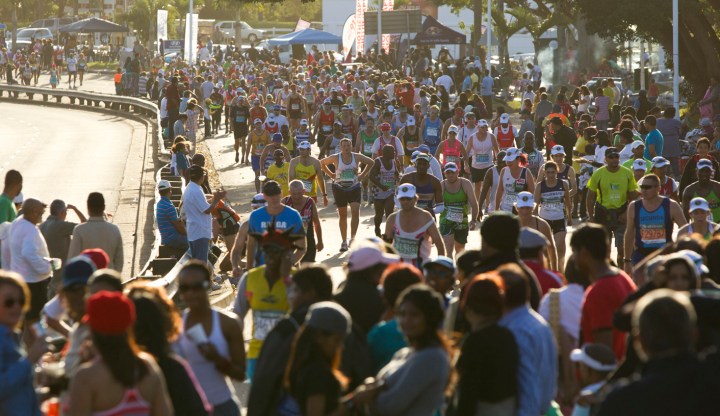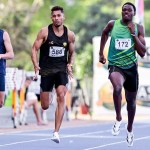Sport
Golden Comrade loses his shine to methylhexaneamine

Ludwick Mamabolo became the country’s darling when he collapsed across the Comrades Marathon finish line, the first South African to win the 89km race since 2005. After enjoying two weeks as a hero, drug tests show he tested positive for a banned stimulant. He now faces the race of his lifetime - to clear his name. By GREG NICOLSON
Ironically, in one of Mamabolo’s speaking engagements since he rocketed to fame, he warned youth in his home province of Limpopo that using drugs and alcohol will lead to an early grave. He might have done well to take his own advice.
The South African Institute for Drug-Free Sport announced on Tuesday that Mamabolo had tested positive for the banned stimulant methylhexaneamine and could face a two-year ban and lose his title. If the independent tribunal, which includes a medical expert, a sports administrator and attorney, finds he used the substance knowingly, Mamabolo will also have to repay his R300,000 prize money. (After winning the event, he said his “minister of finance”, his wife, would help him decide where the money would go.)
Mamabolo’s fall from grace came from a stimulant often found in nasal decongestants, recreational drugs and dietary supplements. The institute’s CEO, Khalid Ghalant, said the stimulant offers “the athlete a heightened sense of awareness, energy and euphoria and can mask fatigue levels in a race such as the Comrades”.
It was added to the World Anti-Doping Agency list in 2009 and was quick to cause controversy. Springbok players Bjorn Basson and Chiliboy Ralepelle were suspended after testing positive for the drug during a 2010 tour of Ireland and Britain. In 2009, five Jamaican athletes tested positive for the substance. In the 2010 Commonwealth Games, nine Australians were found positive while a Nigerian was stripped of a gold medal for using the substance.
The only other winner of the Comrades stripped of the title also tested positive for methylhexaneamine. In 1992, Charl Mattheus’s win was given to the second-placed runner when Mattheus tested positive for the stimulant before it was later unbanned. (Mattheus won the 1997 race).
Basson and Ralepelle were cleared to keep playing for the Springboks because it was found that the stimulant was in a supplement given to the rugby players and they had no knowledge it enhanced performance.
“This is not a doping incident. It’s an incident of inadvertent use through medication of a supplement. To call these guys dopers would be unfair. You can’t label someone a crook if he’s not one… Let’s focus on what is important. Let’s find the steroid-users,” said sports scientist Professor Tim Noakes after the rugby players were suspended.
Mamabolo will be hoping he can also get off the hook. He will likely ask for his B-sample from the race to also be tested. If it comes back positive, he will have to prove he didn’t take the stimulant to improve his performance. That may not be as hard as it sounds. Methylhexaneamine is commonly found in a wide range of cold remedies and dietary supplements, but if Mamabolo takes this line he’ll have to establish that he took the product on advice or explain why he didn’t read its label.
But the damage is done. After only two weeks the speaking tours for SA’s golden boy will end. Those watching the rotating reel of clips on eNews on Tuesday night won’t be able to forget the sentence: “A doping scandal rocks the Comrades marathon as this year’s winner tests positive for banned stimulant.”
Mamabolo’s already started hanging up on journalists as he’s started the arduous task of trying to keep running competitively, hold on to his title, his prize money and prove to the country he’s not a cheat. Gone are the days of addressing Polokwane students.
For the nation, which, like all nations, can rise and fall on the dramas of its athletes, the test results add another conversation topic for the dinner-table pessimists.
“I am just very grateful to be the first South African to win,” said Mamabolo after his victory. “It has pained me every day to look in the newspapers and see that no South Africa name was there… But I am happy and this win is for everyone, the whole country.”
Though Mamabolo must still face a hearing, the positive test pains all who smiled when a South African took back the Comrades title. And even if he’s cleared, whenever he finds his name in the media, the doping incident mention will not be far away. DM
Read more:
- Drug of the year: methylhexaneamine and the supplement industry in The Science of Sport
- Methylhexaneamine rears its ugly head in Runner’s World
- Chiliboy Ralepelle and Bjorn Basson’s failed drug tests highlight growing problem of methylhexaneamine in The Telegraph
Photo: Comrades’ Marathon participants pass through Westville on 3 June 2012. More than 14,000 people started the ultra-marathon, running over 89km between Pietermaritzburg and Durban. (REUTERS/Rogan Ward)




















 Become an Insider
Become an Insider